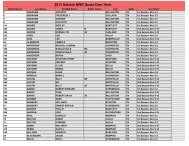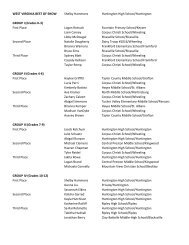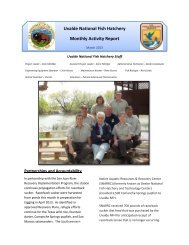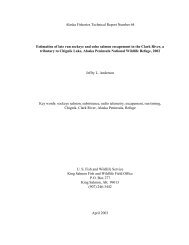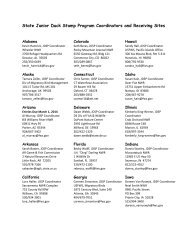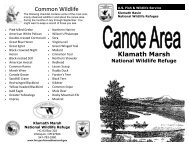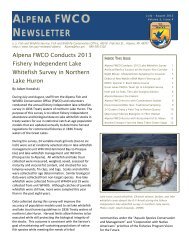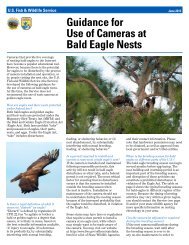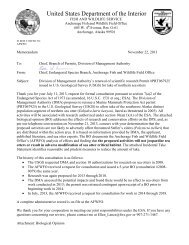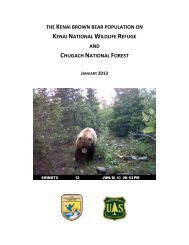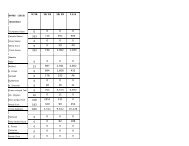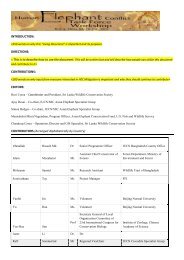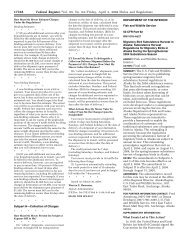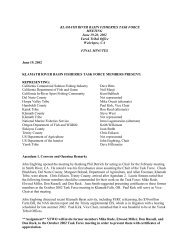Assabet River NWR Final CCP - U.S. Fish and Wildlife Service
Assabet River NWR Final CCP - U.S. Fish and Wildlife Service
Assabet River NWR Final CCP - U.S. Fish and Wildlife Service
You also want an ePaper? Increase the reach of your titles
YUMPU automatically turns print PDFs into web optimized ePapers that Google loves.
Eastern Massachusetts National <strong>Wildlife</strong> Refuge Complex Draft <strong>CCP</strong>/EA November 26, 2003<br />
Some respondents point out the economic benefits of horseback riding, stating that equine<br />
activities are engaged in by a large number of Massachusetts citizens <strong>and</strong> also make a<br />
significant contribution to the Massachusetts economy. For example, they assert that equine<br />
agriculture provides over $200 million per year in direct spending into the Massachusetts<br />
economy, over 5,000 jobs <strong>and</strong> more than $13.2 million in state <strong>and</strong> local tax revenues.<br />
Limiting horseback riding would harm the economy.<br />
Equestrians state that they oppose expansion of the refuge’s boundaries as long as it limits<br />
horseback riding.<br />
Dog-Walking<br />
Many respondents assert that given the popularity <strong>and</strong> dem<strong>and</strong> for areas to walk dogs, <strong>and</strong><br />
the fact that parts of the refuge have been used responsibly for decades by dog-walkers; FWS<br />
should make part of the refuge available for this pastime. These dog walking enthusiasts<br />
request that leashed dog-walking be allowed on refuge trails in appropriate areas, <strong>and</strong> that<br />
strict fines are in place for anyone releasing a dog or failing to pick up after their animal.<br />
Others are willing to allow an exclusion of dogs during the most sensitive times, when<br />
wildlife surveys identify an impact on nesting birds or other animal life. Many of these<br />
respondents view dog-walking as meditative <strong>and</strong> a way of connecting to the natural beauty of<br />
the earth, something that is consistent with refuge goals. These respondents assert that<br />
without substantial evidence that dog-walkers are threatening the integrity of the refuge it is<br />
unjust <strong>and</strong> an act of discrimination to prohibit dog-walking. On the other h<strong>and</strong>, one<br />
respondent would like to see dogs banned from the refuge, stating that many dog owners<br />
don’t obey leash rules to the detriment of wildlife, <strong>and</strong> further, even on a leash dogs frighten<br />
animals.<br />
Birdwatching<br />
Birdwatchers <strong>and</strong> nature photographers are concerned that they will be confined strictly to<br />
trails when observing wildlife, while hunters would not. If hunters are allowed off trail, they<br />
assert, birders should be allowed off trail as well.<br />
Trapping<br />
Some respondents ask that the Refuge be open to beaver <strong>and</strong> muskrat trapping, asserting that<br />
modern traps are instant <strong>and</strong> humane, <strong>and</strong> arguing that small game threatens children, pets,<br />
<strong>and</strong> livestock, <strong>and</strong> that beavers “cause extensive property damage.”<br />
Some respondents ask whether <strong>and</strong> under what circumstances which furbearers could be<br />
trapped, <strong>and</strong> what constitutes an invasive species <strong>and</strong> appropriate control methods.<br />
Some respondents oppose trapping on the grounds that it is inhumane; other respondents<br />
perceive trapping as ham-fisted interference in natural systems that function best on their<br />
own.<br />
Summary of Comments 25



